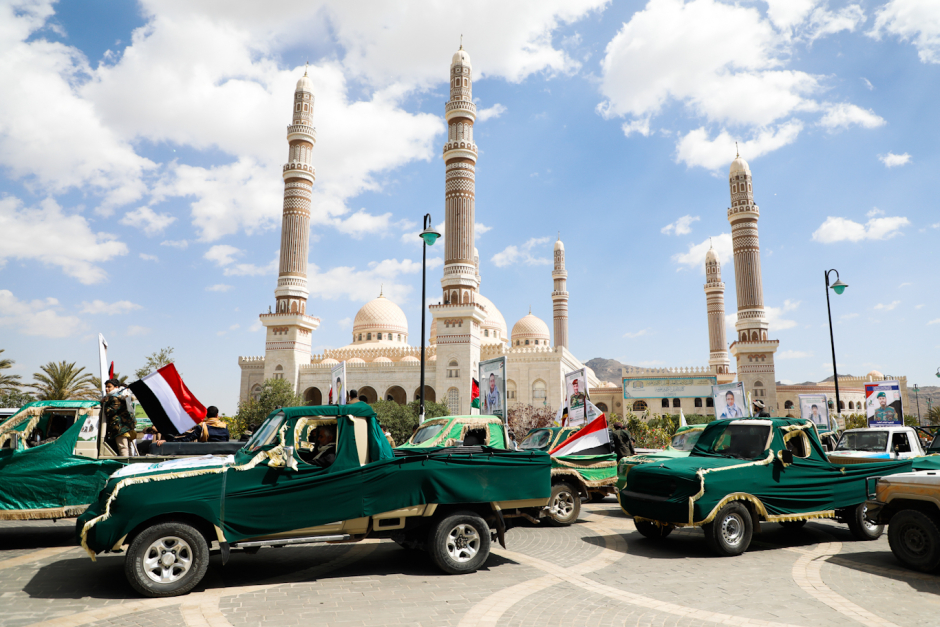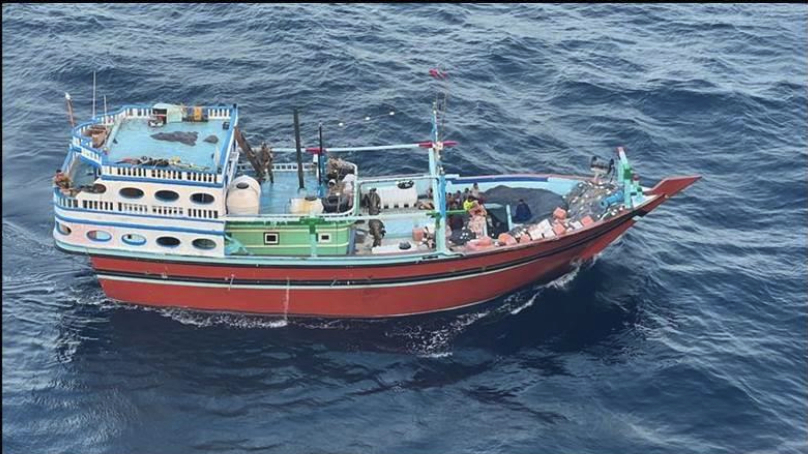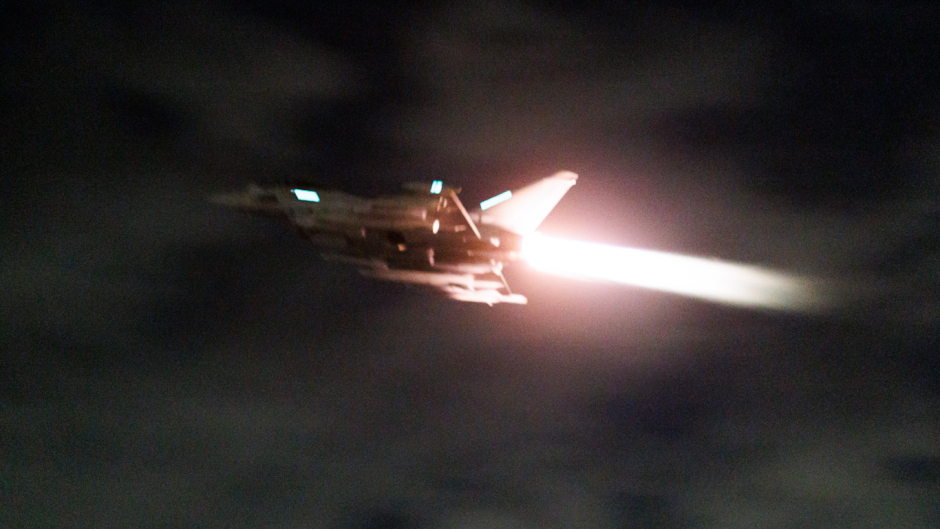In the courtyard of Yemen's famous Al Shaeb Mosque, guards of honor stood at attention accompanied by the melody of military music as the funeral ceremony of Yemeni marines killed in the latest round of U.S. and UK strikes commenced. The mourners, many of whom traveled from the countryside to attend, walked alongside a long convoy carrying the bodies of 17 victims as it made its way through the streets of Sana'a. Mourners held aloft photos of the deceased or thrust their rifles into the air while chanting slogans condemning the United States. Several banners peppered the crowd, emblazoned with the label given to those who gave their lives in what many view as a struggle in defense of Palestine: "Martyrs on the road to al-Quds (Jerusalem)."
Seventeen pickup trucks ensconced in green drapes bore the bodies. They were escorted by family members alongside thousands of mourners leaving Sana'a for the hometowns of the victims who hailed from various regions of Yemen. The scene unfolded last Sunday when thousands of angry Yemenis took to the streets of Sana'a and other cities to hold a funeral for those killed by the attacks. "Retribution against American soldiers... We will not abandon our revenge," some mourners proclaimed.
In Bani Matar, 70 kilometers west of Sanaa towards the Hodeida Road, the mothers of Ziad Ajlan and Hashem Al-Sawari watched the convoy from a rooftop as it carried along the bodies of their sons. Ziad and Hashem were not involved in the fighting; they were among a number of civilians killed in attacks launched by the U.S. Navy on the Yemeni mainland one week ago. My son was martyred on the road to al-Quds," Ziad's mother said proudly. "We will not be broken, and we will not abandon Gaza."
U.S. and British officials maintain that their attacks target "Houthi" military positions - ammunition stores and missile launch sites, but the reality of the ground tells a different story. Yemeni civilians say they are blind and indiscriminate and often leave civilians maimed or killed. Assuming the U.S. and UK are acting in good faith, it is clear that their intelligence information is lacking. A truck belonging to a farmer carrying plastic pipes was targeted in an airstrike outside the city of Saada last week. It is believed that the pipes were mistaken for missiles.
This story has repeated itself ad nauseam throughout Yemen since the end of December when the multinational "Operation Prosperity Guardian" (OIR) was launched in a thus-far failed attempt to protect ships linked with Israel from Ansar Allah. This week alone, as many as 40 strikes were launched by the U.S. and the UK, most targeting the coastal city of Hodeida.

The Fog of War
The danger of Washington's attacks on Yemen's mainland lies not only in exposing civilians to danger but has the potential to spark retaliatory measures taken by Ansar Allah should pressure from the public and family members of victims continue to mount.
On December 29, when U.S. forces killed 10 Yemeni sailors aboard three ships in the Red Sea, Ansar Allah refrained from retaliating. But when American and British bombs peppered mainland Yemen the next month, striking major cities with over 100 precision-guided missiles, leaving civilians dead and maimed, Ansar Allah reacted, carrying out a barrage of retaliatory attacks.
Some Yemeni officials have even hinted that two U.S. Navy Seals that the U.S. government claims drowned while boarding a boat smuggling weapons into Yemen were actually killed in combat. It is not known whether the soldiers were killed in attacks by Ansar Allah ballistic missiles or drones or during a failed commando operation as the U.S. claims, but what is clear is that the U.S. is covering its losses and information about the deaths of the Seals has been highly politicized.
In fact, many of the details surrounding hostilities between the U.S. and Ansar Allah have been cast in a heavy fog of war, and it will likely be years before the truth is revealed. What is certain is that Ansar Allah has caused direct material damage to U.S. military vessels, targeting numerous times with advanced missiles and drones launched. In the wake of every such attack, a statement was issued, reaffirming Ansar Allah's right to take revenge for those killed in American and British bombing raids.
On January 31, the Ansar Allah announced that the American destroyer, the USS Gravely, was hit by several anti-ship missiles. In the wake of the attack, US Central Command (CENTCOM) announced that the Gravely had shot down an advanced anti-ship cruise missile. Later, reports emerged that the destroyer in question and other Western military assets in the area had failed to intercept the missile until it got within "4 seconds from hitting the U.S. warship."
On January 25, Ansar Allah said that it had clashed with American destroyers in the Gulf of Aden and Bab al-Mandab for two hours. One U.S. Navy vessel was directly hit after a failed interception attempt, according to Ansar Allah, who have been improving their capabilities since 2014, after a failed Saudi-led and U.S.-backed bombing campaign left the country in tatters.

Manufacturing Consent
Although President Joe Biden has repeatedly claimed that the United States does not seek to expand the war in the Middle East, the actions of the US military are undoubtedly making the situation in the Red Sea more tense. In the wake of American airstrikes targeting Hodeida on Thursday - for the ninth time that day alone, Ansar Allah Armed Forces spokesperson Brigadier Yahya Saree revealed that the group would take "further measures" within its legitimate right to self-defense in response to the repeated U.S.-UK aggression. In the same statement, Saree announced that the Barbados-flagged British Bulk Carrier ship, the LYCAVITOS, was targeted by naval missiles while sailing in the Gulf of Aden, raising questions about the actual deterrence factor of America's escalatory approach.
Prior to that, the leader of Ansar Allah, Abdul-Malik al-Houthi, the leader of the revolution that the U.S.-backed Yemeni government in 2014, confirmed that any escalation on Ansar Allah's part would be against Israel and to confront American and British aggression and would not target the interests of ordinary Westerners. The comment came in response to claims circulated in the media that Ansar Allah could sabotage a network of underwater internet cables that run through the Red Sea. "We do not plan to target submarine cables, and we have no intention of doing so, and what is reported in the media is a lie aimed at distorting our humanitarian position on the war on Gaza," he said. Many Western media outlets promoted the claim, raising fears over the safety of infrastructure critical to the functioning of the Western Internet and the transmission of financial data. Yemen is strategically located, as internet lines connecting entire continents pass near it.
Airstrikes and claims that internet access may be cut off may be the tip of the escalatory iceberg, according to the government of Sana'a. The Minister of Information, Daifallah al-Shami, held a press conference on Thursday announcing that they have information that the UAE is seeking to recruit agents from multiple foreign nationalities in cooperation with Al-Qaeda and ISIS to target ships in the Red Sea and the Arabian Sea in order to confuse and distort operations carried out by Ansar Allah in support of Gaza. According to al-Shami, the move is supported by the U.S.
"we will not abandon Gaza"
Contrary to what is being promoted in much of the Western media, which has taken the line that Ansar Allah's Red Sea blockade has nothing to do with the ongoing genocide in Gaza, a review of the targets of Ansar Allah's attacks makes their motivations clear. On October 19, Ansar Allah fired drones and missiles at Israel's southern Eliat Port. In mid-November, the naval forces seized an Israeli ship headed towards occupied Palestine. Shortly after, Ansar Allah publically announced that the Israeli-linked ship would not be allowed to pass through the Baba al-Mandab Strait. Later, they announced that the ban on shipping would extend to all vessels attempting to reach Eliat Port. All of these measures were in support of a single, repeatedly declared goal, which was to pressure Israel to stop its war on Gaza and allow food and water to enter the besieged strip.
With visible sadness and anger, Abdul-Malik al-Houthi enumerated in a televised speech on Tuesday the reasons that motivate Yemen to continue operations to prevent international navigation supporting Israel in the Red Sea - the continued mass killing of the Gazans, renewed American support for Israel, including with lethal weapons and the use of internationally banned weapons against civilians in Gaza, including white phosphorus.
Al-Houthi said that "the Yemeni military's retaliatory strikes in the Red Sea had proven to be effective as it led to the almost complete closure of the port of Umm al-Rashrash (the name of Eliat before Israel annexed it), and all food supply chains to Israel that were passing through the Red Sea and Bab al-Mandab stopped by 70%, and prices in the Israeli market rose by 30-50% after ships were forced to divert course through the Cape of Good Hope." Israel, he noted, was one of the largest beneficiaries of maritime trade, with imports in 2022 reaching to $133 billion "thanks to the Red Sea."
Responding to those who question the feasibility of Ansar Allah's position, Al-Houthi said that "Yemeni operations have caused repercussions for ship insurance," noting that insurers are now refusing to insure ships heading towards the ports of occupied Palestine. "Not only that," he added, "but insurance companies require Israeli and American ships to pay additional amounts of up to 50%."
"Our operations at sea led to a decline in Israel's total imports of products by 25% during the past months," Al-Houthi said, "The Israeli Ministry of Economy and Industry admitted that the Red Sea operations harmed its trade relations with 14 countries."
Amid threats of escalation and even whispers of a Western-led ground invasion of Yemen, Ansar Allah has reiterated its commitment to its mission. Mobilization, military training, demonstrations, and other activities will be continued as long as the aggression against Gaza continues, it has reaffirmed, saying that operations at sea will continue until Israel "allows food and medical supplies and the delivery of basic needs into Gaza." "The U.S. and UK will not achieve their goals through aggression against our country, and the only solution is to stop the aggression and deliver food and medicine to the people of Gaza," Al-Houthi vowed.
Feature photo |In this image provided by the Ministry of Defence, an RAF Typhoon aircraft takes off to conduct further strikes against Ansar Allah targets in Yemen from RAF Akrotiri, Cyprus, Feb. 3, 2024. Jake Green |Ministry of Defence |AP
Ahmed AbdulKareem is a Yemeni journalist based in Sana'a. He covers the war in Yemen for MintPress News as well as local Yemeni media.
